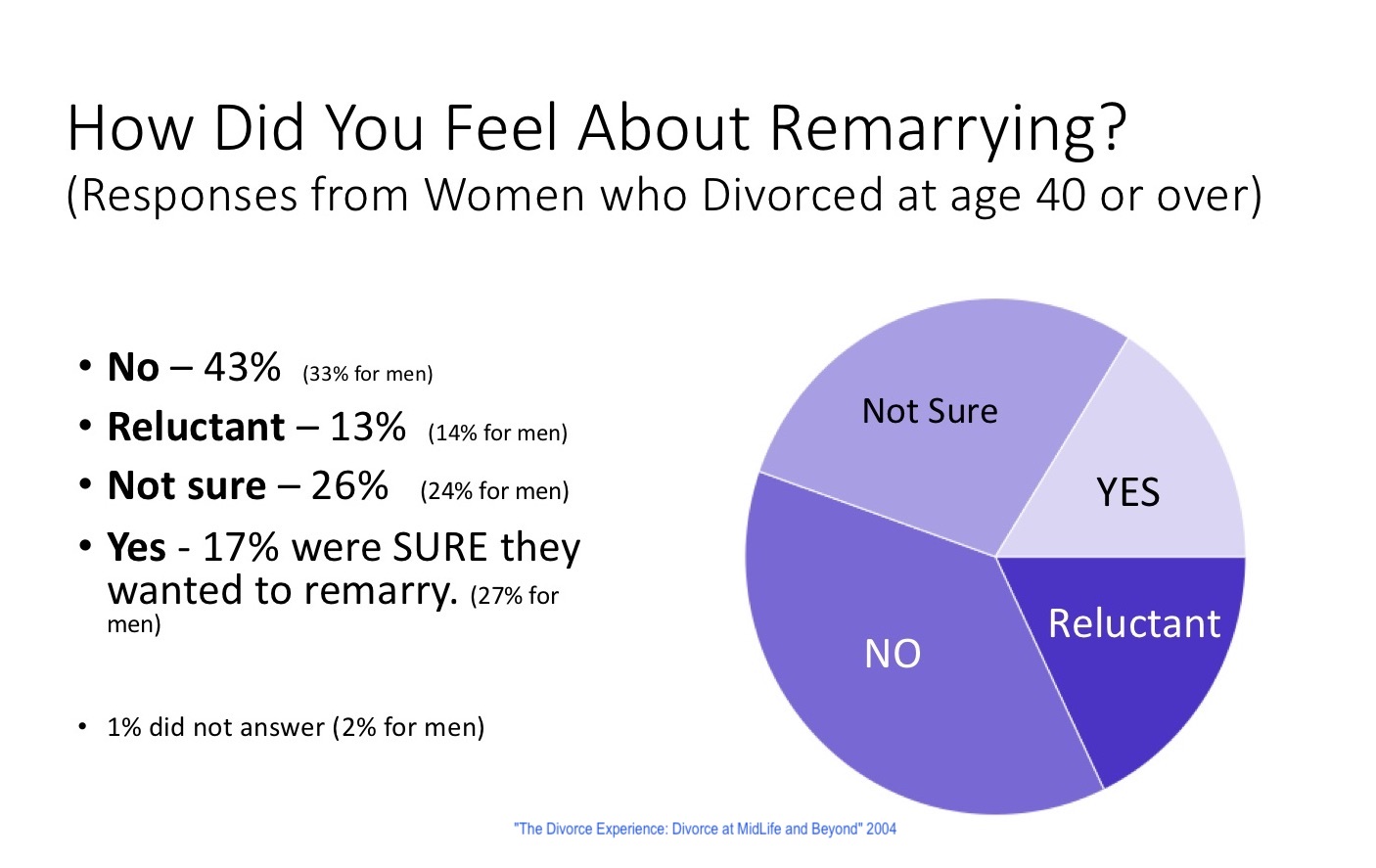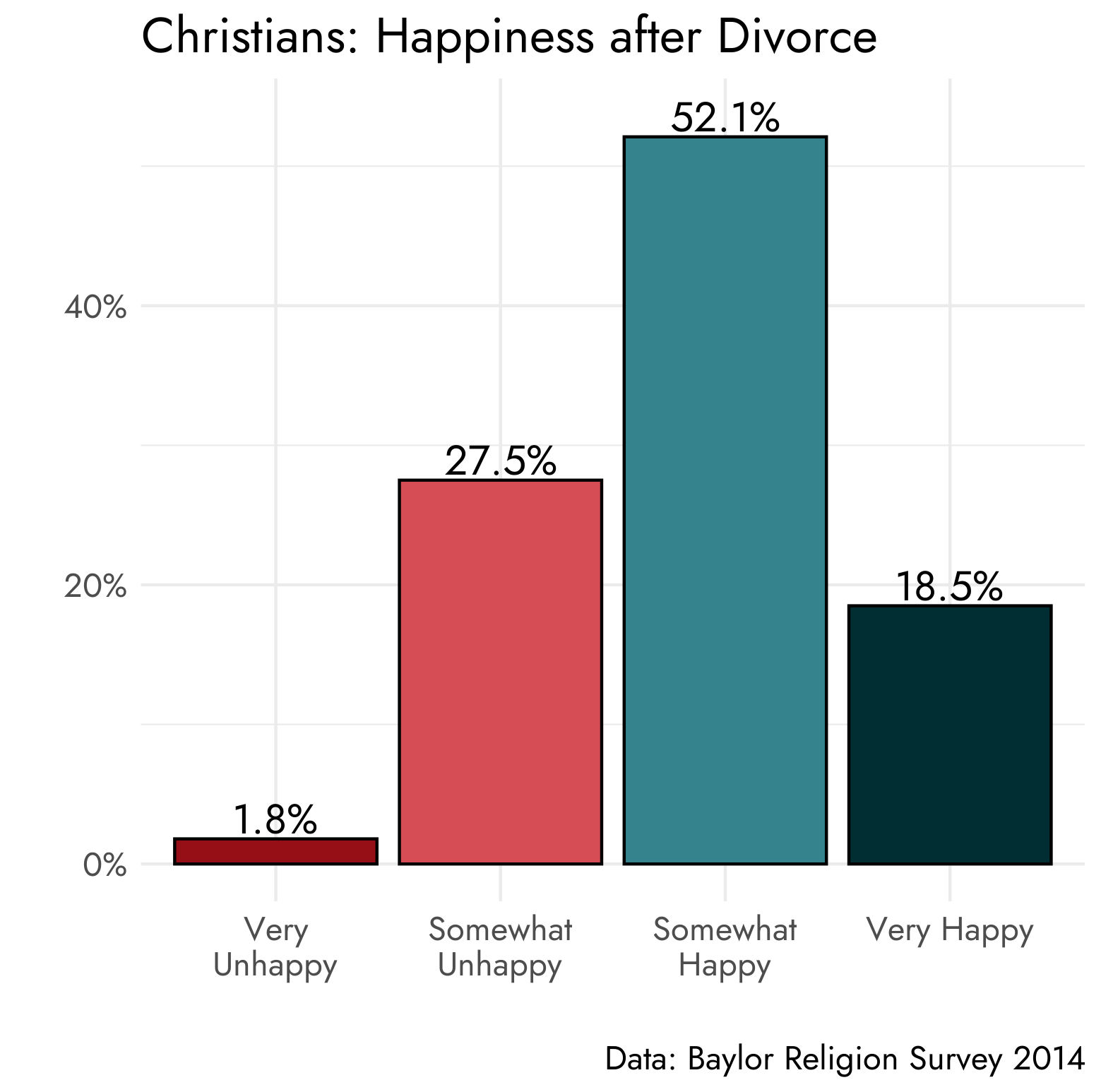Will I Find Love Again?
To Remarry or to Stay Single: Finding Love Again and Learning to Respect Yourself
If you do an Internet search and enter the phrase “will I find,” the autocomplete fills in “love” as the first option. A lot of people are asking that question. People ask Google “will I ever find love” far more often than they ask, “will I ever feel better,” or “will I ever get married.”

Wanting to find love and belonging is deep in the human heart. But getting married again? Not as much. Some people want to remarry; some do not.
Let’s look at some of the myths about remarriage. (Some of them will be very surprising.)
Myth 1: Everyone wants to remarry.
Some people want to remarry; others do not. Usually younger people wish to remarry, and three in four women who divorced (at ages 15-44) do remarry within ten years.[1] The remarriage rate is very high for those under twenty-five.[2]
Of women who divorce at age forty or older, however, more than two in five (43%) say they do not want to remarry. And for men who divorce over age forty, one in three (33%) say they don’t want to try again. Another 26% of women weren’t sure (and 24% of men), and the vast majority say they don’t want to run the risk of having another bad marriage. Many say they don’t want the trouble of finding another partner. Some say they like the freedom to make their own plans and decisions.[3]
For people who divorced when they were age forty or over, many prefer to stay single:
Nearly half of women in this age group do not want to remarry. Men are much more motivated to find a new spouse than women are: 27% were sure they wanted to remarry (compared to only 17% of women who said the same). As a group, women are very wary (“once burned, twice shy”), and so it’s not surprising that we find that the men’s remarriage rate is twice as high as women’s.[4]

Myth 2: Your second marriage is likely to end in divorce and won’t be any happier because you bring your problems with you.
The first part of this myth is only partially true. The divorce rate for second marriages nationwide is indeed higher than first marriages: 60%. (And for third marriages, it is 65%.)
But that likelihood is for all remarriages, not remarriages after a life-saving divorce.
Research shows that people whose marriages had been very unhappy for a long time—people who needed a life-saving divorce—are likely to have a happier second marriage.
Researchers Hawkins and Booth studied people who were in long-term unhappy marriages (a minimum of twelve years of being unhappily married). They followed these couples for many years beyond the twelve-year point. They compared those who stayed married and those who divorced, and they tracked their wellbeing in several different ways.
They concluded that both those who divorced and remarried, and those who divorced and stayed single, were much better off on average than they would have been if they had stayed in the bad marriage:
“Divorced individuals who remarry have greater overall happiness, and those who
divorce and remain unmarried have greater levels of life satisfaction, self-esteem and overall health than unhappily married people.”[5]
Myth 3: You will never remarry, and you’ll live a miserable, lonely life.
As I mentioned, I was single for more than twenty years after my divorce. Yet I was very happy once I got past those first two years.
I never dreamed I would be single for twenty years,
and I definitely never dreamed that those years would be
so rewarding, purposeful, and meaningful.
But researchers could have predicted that. They had already found that people were happier once they got out of a destructive long-term marriage. Based on their findings, it doesn’t matter whether you remarry or not. You will be happier, on average, than if you had stayed.
If you choose to stay single, your life is likely to be healthier and more satisfying, and you’ll have more self-respect.
Researchers Hawkins and Booth concluded this about these long-term unhappy unions:
“Remaining unhappily married rather than divorcing is never beneficial to the psychological wellbeing or overall health of the individuals in this study.”[6]
Happiness and Long-Term Singleness after Divorce
I’m embarrassed to say this, but I was brought up with the unspoken message that said women friends are just place-keepers until you find a husband. I bought that message for the first thirty-five years of my life. I was wrong.
In Chapter 8 of my book (Safe Churches and Friends), I tell the story of how my best friend and I started a divorce recovery group at our church and how it provided a lot of great friendship and support. Those women are some of the strongest and most courageous people I know. They are amazing survivors. I was honored to hear their stories and get a front-row seat to watch how the Lord healed them and gave them a new passion for growth.
In addition to that group, I also joined groups made up of men and women who were interested in the same things I was: friends who loved photography, business, travel, and books. My circle of friendships grew. Between my children and my close friends, I found the love and belonging I craved.
Here are some reasons to stay single (adapted from my article originally published by Psych Central):
- Being single can force you to be a better person. As a single person, you are more likely to have built-in motivation to be a good employee, friend, relative and neighbor. You have no automatic safety net, in the form of a spouse, and because of this, many single people create and nurture their own circles of people who are important to them. They are reliable and responsible, whereas some married people stop growing and just coast.
- Being single gives you time to contemplate life and become deeper. You get to know yourself when you are alone. You find out what really matters: integrity, self-awareness, and your core values. You don’t have to conform to peer pressure. You can be authentic.
- Being single allows you to be available for interesting adventures. Married people spend a lot of time with each other. In fact, they feel obligated to spend a majority of time together. But single people have the freedom to explore new ideas, new places, and new people.
- Singles have rich friendships. Most married people spend time with their spouse and kids, and maybe a handful of friends. Singles develop deep relationships with all kinds of people,[7] including their extended family members.
Has Anyone Ever Surveyed the Happiness of Christians After Divorce?
Yes, Baylor University (Baylor is the largest Baptist university in the world) has collected data that indicate that 7 in 10 Christians are happy after divorce. (Five in 10 are "somewhat happy" and 2 in 10 are "very happy" after divorce.)

Footnotes:
[1] M. D. Bramlett and W. D. Mosher, “Cohabitation, Marriage, Divorce, and Remarriage in the United States,” Vital and Health Statistics 23, no. 22 (2002): 78.
[2] Valerie Schweizer, “The Retreat from Remarriage, 1950-2017,” Family Profile 17 (2019), accessed 12/12/19, https://www.bgsu.edu/ncfmr/resources/data/family-profiles/schweizer-retreat-remarriage-fp-19-17.html.
[3] Xenia P. Montenegro, “Divorce Experience: A Study of Divorce at Mid-Life and Beyond,” AARP The Magazine (2004), A-23, accessed 12/18/19, https://assets.aarp.org/rgcenter/general/divorce.pdf.
[4] Schweizer, “The Retreat from Remarriage.”
[5] Daniel Hawkins and Alan Booth, “Unhappily Ever After: Effects of Long-Term, Low-Quality Marriages on Wellbeing,” Social Forces 84, no. 1 (September 2005): 464. The authors of this study mention an earlier study (Waite et al., 2002) that got a lot of attention from religious organizations. That study used only one item to determine marital quality, and it said that two thirds of unhappily married couples who stayed married for 5 more years were happier. The Hawkins and Booth study was different. In addition to being much more thorough, it specifically focused on people who had been married (very unhappily) for more than 12 years; it used several items to measure marital quality, and it determined that those who divorced from these chronically long-term at-risk marriages were significantly happier after divorce than they had been before.
[6] Ibid., 464.
[7] Bella DePaulo, “Put a Ring on It—A Singleness Ring,” Psych Central (2017), accessed 12/12/19, https://blogs.psychcentral.com/single-at-heart/2017/09/put-a-ring-on-it-a-singleness-ring-guest-post-by-gretchen-baskerville/.
POPULAR BLOG POSTS
Start Here
What is a Life-Saving Divorce? How Many Are There? (or watch the video)
Life-Saving Divorce: Introduction What Is this Book About? (audio and transcript)
About Me: Why Is a Nice Christian Girl Like Me Promoting Divorce?
How Can I Get the Book, The Life-Saving Divorce? (Amazon affiliate link.)
Physical and Emotional Abuse & Infidelity
Help! I Am Alone with the Abuser
Abuse is Biblical Grounds for Divorce
“But He Never Hit Me”: Divorce for Neglect, Emotional, and Financial Abuse
Pastors Who Accept Physical and Emotional Abuse as Grounds for Divorce
Severe Emotional Neglect: Toni’s Story of Finding Freedom (video)
40 Years of Murderous Rages and How I Got Free! Karen’s story (video)
How Churches Should Handle Abuse Victims (video with Pastor Neil Schori)
Help! I’m Married to a Cheater: Should I Stay or Go?
Married to a Pedophile: How I Got Out – Pam’s Story (video)
God Allowed Divorce to Protect Vulnerable People
Jesus' Greatest Divorce Sermon - Luke 13 (or watch the Video)
Pastors Who Accept Physical and Emotional Abuse as Grounds for Divorce
Myth: The Person Who Files for Divorce Caused the Divorce
Jesus Said, "Love My Enemy"—Can I Still Divorce Them?
But I Thought it Was God's Will for Me to Marry this Person!
Is Pointing Out Marriage-Endangering Sin Being Judgmental? (video)
One Woman's Story: Adultery, Prayer and the Bible
Is Marriage an Unconditional Covenant or a Conditional One? (Video)
Does Divorce Shatter the Image of Christ and the Church as John Piper Suggests?
Divorce and the Good Samaritan Story
Myth: Divorce is the Unpardonable Sin and "God Hates Divorce"
Myth: Your Divorce Will Shatter the Image of Christ and the Church
Myth: You Must Forgive and Forget Over and Over, Forever
How to Find a Good Supportive Church
Pastors Who Accept Physical and Emotional Abuse as Grounds for Divorce
1 Million God-honoring Divorcees Cannot Find a Good Church
Church Denominations and Divorce Policies Comparison Chart
Excommunication for Getting Divorced? What to Do If Your Church Threatens You
Evangelicals Shooting their Own Wounded Divorcees (video) or blog/transcript
How to Handle Criticism When You Divorce (video-3 parts) Natalie Hoffman, Gina Kaye
Myth: You Don't Take God-Ordained Marriage Seriously
Sermon Ideas for Domestic Violence Awareness Month - October
Churches That Block Abused Wives (and Husbands) From Divorcing
Southern Baptists make Evangelicalism Unsafe for Abused Wives & Husbands
How Churches Should Handle Abuse Victims (video with Pastor Neil Schori)
Divorce Saves Lives: The Surprising (Wonderful!) Truth About Divorce Nobody Told You
Your Kids Will Likely Be Fine After Divorce (Nearly 8 in 10 Are!)
10 Facts Evangelical Pastors MUST Know about Kids and Divorce [VIDEO]
There Is No Divorce Crisis. We have a Sin Crisis.
Myth: 95% of Divorces are for Falling Out of Love
Will I Ever Find Love Again? Dating After Divorce: Good News
Dating after Divorce: An interview with Gina Kaye
I Fear I'll Never Find a Healthy Relationship
Remarriage after Divorce: How Can I Claim to be the Innocent Spouse? I Had My Faults Too!
Finding Happiness and Health After Divorce
Happiness Either Way: Remarriage or Staying Single
Divorce May Improve Your Health: Depression, Suicidal Thoughts and Medical Issues
How My Health Improved Dramatically After Divorce: Karen’s Story (video)
“I’m Off of All My Depression Medications Now That I’ve Divorced” Shari’s story (video)
PTSD, EMDR and My Major Health Improvements after Divorce Toni’s story (video)
Thriving After Divorce: These Christians Tell their Stories
Christians Finding Peace after Divorce: Shirley Fessel, Author (Audio) or (Video)
10 Turning Points: Stories of How Others Decided to Stay or to Go
Married to a Pedophile: How My Kids and I Got Free! (video)
Finding Joy after a 40-Year Abusive Marriage (video)
Can I Divorce My Mentally Ill, Destructive Spouse? Yes! Amanda’s Story (video)
From Bondage to Glorifying God! 5 Survivor Stories (after 20-, 30-, 40-year long abusive marriages)
Self-Doubt, Second-Guessing Ourselves, and Gaslighting
Am I the One Destroying the Relationship?
How Can I Call Myself the Innocent Spouse? I Wasn’t Perfect Either (video)
Is Pointing Out Marriage-Endangering Sin Being Judgmental? (video)
Myth: He Wouldn't Cheat or Watch Porn if You Gave Him More Sex
Myth: You're Lying: We'd All Know If Your Spouse Was That Bad
Myth: It Takes "Two to Tango" and "All Marriage Problems are 50/50"
How to Handle Criticism When You Divorce (video-3 parts) Natalie Hoffman, Gina Kaye
Children and Divorce: Researchers Give Hope
Researchers Know Your Kids Will Likely Be Fine After Divorce
5 Studies That Say Your Kids are Likely to Be Okay After Divorce (video)
Myth 21: Divorce will Destroy Your Children, So Stay for the Sake of Your Kids
High Conflict Divorce and Parenting
Research shows: Your Kids Will Likely Be Fine After Divorce: In Fact It’s Best to Divorce to Get Away From Abuse
12 Tips for Talking with Angry, Alienated Kids
Myth: Divorce will Destroy Your Children, So Stay for the Sake of Your Kids
Recommended Reading List and Free Resources for Christians and Other People of Faith
Best Books/Resources on Abuse, Infidelity, Parental Alienation, and High-Conflict Divorce
Common Myths
Myth: Your Marriage Would Be Great if You Just Submitted More
Myth: Divorce will Destroy Your Children, So Stay for the Sake of Your Kids
Myth: Divorce is the Unpardonable Sin and "God Hates Divorce"
Myth: You Just Didn't Try Hard Enough
Myth: You Don't Take God-Ordained Marriage Seriously
Myth: Your Divorce Will Shatter the Image of Christ and the Church
Myth: You Must Forgive and Forget Over and Over, Forever
Myth: 95% of Divorces are for Falling Out of Love
27 Myths about Divorce That Probably Don't Apply to Committed Christians
FREE
Download “7 Effective Ways to End the Stigma of Divorce in the Church” (Sign up)
Download “7 Effective Ways to Deal with Criticism when You Divorce” (Sign up)
Home Follow me on Facebook Follow me on Twitter Buy the book.
Request to Join the Facebook Private Group (Don’t forget to answer the questions)
Subscribe (FREE) to my You Tube Channel
Gretchen’s Life-Saving Divorce Interviews in the Media
Examples of 150 examples of types of abuse (physical, emotional, spiritual, sexual, financial, and neglect) and explaining the term "gaslighting" and "the abuse cycle" and "power and control wheel" along with many first-person stories, read Chapter 4 in The Life-Saving Divorce.
For more on the myths of divorce, buy the Life-Saving Divorce.
As an Amazon Associate I earn from qualifying purchases.

